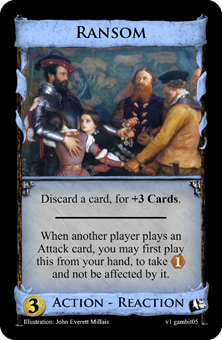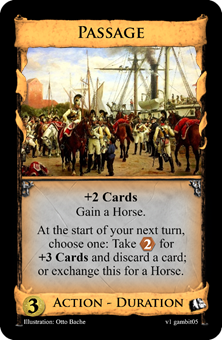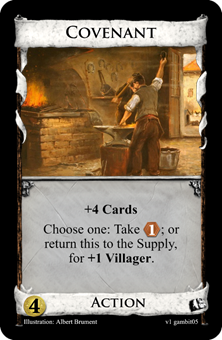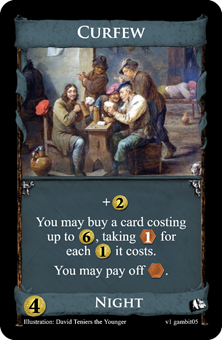Part 2Here are the remaining 4 cards that in some way deal with Debt:




Ransom$3 – Action - Reaction Discard a card, for +3 Cards.
----------------------------
When another player plays an
Attack card, you may first play
this from your hand, to take 1 Debt
and not be affected by it.
| Passage$3 – Action - Duration +2 Cards
Gain a Horse.
At the start of your next turn,
choose one: Take 2 Debt for
+3 Cards and discard a card;
or exchange this for a Horse. | Covenant$4 – Action +4 Cards
Choose one: Take 1 Debt; or
return this to the Supply,
for +1 Villager.
| Curfew$4 – Night +$2
You may buy a card costing
up to $6, taking 1 Debt for
each $1 it costs.
You may pay off Debt.
|
Ransom. The idea here is to get Debt for successfully blocking the consequences of an opponent’s Attack card. Ransom also draws some cards just like when it’s played on the player’s own turn.
Passage. This is based on the same idea as that for
Serf (
see Part 1), i.e. a powerful card can be bought for little money, but in order to keep it, players get some Debt later. If a player doesn’t want to keep a Passage, they get a Horse as consolation.
Covenant. Again, the same principle as with
Serf. If a player chooses not to take Debt for keeping Covenant, they are rewarded with a Villager, which can be useful after drawing a lot of cards.
Curfew. This is basically a Night-Silver that allows buying a card in the Night phase for Debt. Any unspent money from the regular Buy phase can be used as well. Like in the Buy phase, a player who is already in Debt cannot buy a card via Curfew, but they can at least use the +$2 for paying off the Debt.
I hope you enjoy them and of course that you give some feedback on these cards.
 Author
Topic: Some cards that deal with Debt in different ways (Read 3705 times)
Author
Topic: Some cards that deal with Debt in different ways (Read 3705 times)
